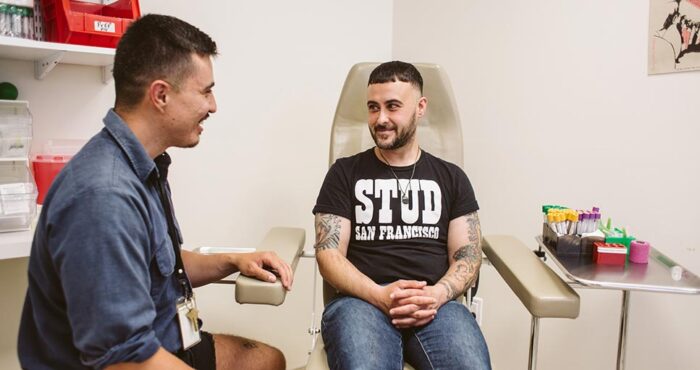New research: Awareness, perceived effectiveness of U=U and intermittent PrEP low among MSM in New York City
PrEP and treatment as prevention (TasP) are empowering people of any HIV status to live without fear of HIV. PrEP reduces anxiety around HIV infection for people who are HIV-negative and undetectable equals untransmittable (U=U) is changing the landscape of HIV “risk.”
But not everybody has equal awareness of these game-changing HIV prevention tools, or perceives their effectiveness to the same degree.
In a recent study with men who have sex with men in New York City, PrEP was widely properly recognized as effective in preventing HIV infection while the perceived effectiveness of treatment as prevention lagged. Fewer participants acknowledged the effectiveness of “intermittent PrEP” or “PrEP on-demand” to prevent HIV infection.
All of these HIV prevention strategies are widely-supported with research, but have enjoyed different levels of promotion by health agencies and media. The challenge, the study authors say, is to get the word out about these effective ways to prevent HIV, especially among people who may not be connected to HIV services or other health services.
“Our findings confirm that TasP (treatment as prevention, or U=U) promotion needs to reach out to people who are not already engaged in HIV or PrEP care,” said Karolynn Siegel, PhD and Etienne Meunier, PhD from Columbia University Medical Center. “MSM may be reluctant to believe in the effectiveness of TasP, especially after decades of public health messages emphasizing the importance of condoms for preventing HIV transmission during anal sex.”
Online surveys about PrEP, HIV and sex
The researchers collected data from hundreds of men who have sex with men living in New York City from November 2016 and June 2017. Participants answered questions about their sexual identity, sexual orientation, sexual behavior in the previous three months, use of PrEP, HIV status and how effective they think different HIV prevention strategies are.
Participants were asked to rate “how much protection” the following strategies provide against HIV transmission:
- Daily PrEP (“The HIV-negative man is taking PrEP/Truvada every day.”)
- Intermittent PrEP (“The HIV-negative man takes PrEP/Truvada only soon before and after sex—like a day or two before and a day or two after.”)
- Treatment as prevention (“The HIV-positive man maintains an undetectable viral load.”)
A total of 732 men who have sex with men completed the survey, with 18% reporting that they were HIV-positive and 82% reporting that they were HIV-negative or unaware of their HIV status. 17% of HIV-negative participants reported currently using PrEP and 5% had used PrEP in the past. 87% of HIV-positive men reported that they had an undetectable viral load.
About 10% of participants did not know what PrEP was and 6% did not know what it means to have an undetectable viral load.
Perceived effectiveness of daily and intermittent PrEP
A majority of people (70%) understood that daily PrEP offers “a lot of protection” or “complete protection” from HIV transmission. A much lower percentage of participants (17%) said that intermittent PrEP offered a lot of or complete protection.
Although research has shown that intermittent or on-demand PrEP dosing is effective at preventing HIV infection when used by people having anal sex, the U.S. Food and Drug Administration has only approved Truvada for PrEP for daily dosing. Canada, Australia and some European countries, as well as the International AIDS Society in the U.S., have endorsed intermittent PrEP as an effective HIV-prevention strategy for people having anal sex.
“We could expect the perceived efficacy of the strategy to be higher if it came endorsed by public health agencies. Studies have found that, when it [intermittent PrEP] is presented to them as an effective option, MSM are generally interested in intermittent PrEP,” the authors said.
Perceptions of U=U
Of the 639 men who responded to questions about the effectiveness of various HIV-prevention strategies, only 39% of participants correctly identified that having an undetectable viral load provided “a lot of protection” or “complete protection” from HIV transmission.
More than half of men living with HIV (58%) perceived that having an undetectable viral load prevents HIV transmission (i.e., understood U=U). About half (49%) of HIV-negative men who had taken PrEP before or were currently taking PrEP believed U=U. Of HIV-negative men who had never taken PrEP, less than a third (28%) correctly perceived the effectiveness of U=U.
“Participants were generally aware of TasP [treatment as prevention, or U=U] but also few seemed to believe it would offer adequate and reliable protection against HIV transmission,” said Siegel and Meunier. “It seems that men who more frequently utilize sexual health services are more likely to know of and believe in the effectiveness of TasP. Our study confirms a need to educate men who are not HIV positive and men who do not use PrEP about TasP. Much still needs to be done to promote TasP and make the strategy acceptable among MSM and the general population.”
—
Source
Siegel, K. and Meunier, E. Awareness and Perceived Effectiveness of HIV Treatment as Prevention Among Men Who Have Sex with Men in New York City. AIDS and Behavior, Jan. 2019.
Get the facts about PrEP & U=U
People living with HIV who maintain undetectable viral loads on HIV treatment do not transmit HIV. Read more about the research and why we know this to be true with an explanation from Chris Hall, MD, and get involved in the U=U movement by Prevention Access Campaign. Check out the interactive U=U positive series with free posters and videos sharing what it means to be undetectable.
Get info about PrEP from San Francisco AIDS Foundation and find out where to access it at Please PrEP Me.










